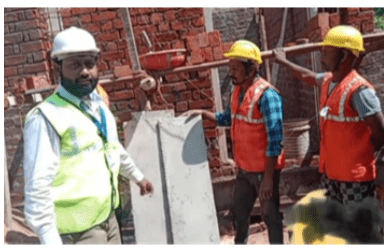Sri Vijaya Puram, June 10: Once engulfed by loss and unemployment during the COVID-19 pandemic, a 35-year-old man from South Andaman has emerged as a symbol of transformation and hope. Anupam Sarkar, a resident of Chouldari, battled joblessness and personal tragedy but eventually secured a dignified livelihood through the Deen Dayal Upadhyaya Grameen Kaushalya Yojana (DDU-GKY), a government-backed rural skill development initiative.
During the peak of the pandemic, Sarkar was among the many whose lives were upended. Having lost his job, he struggled to sustain himself financially. The crisis deepened with the passing of his father, compounding his emotional and financial stress. Despite efforts to find work, stable employment remained elusive for months.
In pursuit of a government position, Sarkar applied for a DRM post and appeared for an interview. There, a panel member noticed his potential and directed him toward the DDU-GKY programme, a skill development scheme aimed at rural youth. Motivated by the suggestion, Sarkar approached his local Panchayat Office for further guidance.
Officials introduced him to the opportunities under DDU-GKY, and with the scheme’s support, he enrolled in a Rural Mason course offered by the Padmaranjeeta Education Trust in Odisha. The program not only offered vocational training but also played a crucial role in boosting his morale and altering his perspective.
The course imparted practical skills for the construction sector, and the post-training placement support enabled him to secure a position as a Supervisor in Odisha. Over time, Sarkar advanced in his career and now holds the role of District Coordinator in Assam. His current employment reflects a significant shift from the bleak uncertainty he once faced.
Sarkar’s journey underlines the potential impact of targeted government schemes like DDU-GKY, particularly in remote regions like the Andaman and Nicobar Islands. The structured training, mentorship, and placement assistance offered under the scheme have been instrumental in enabling rural youth to access better livelihood options beyond their geographical limitations.
The Directorate of Rural Development, Panchayati Raj Institutions (PRIs), Urban Local Bodies (ULBs), and the DDU-GKY team played pivotal roles in ensuring seamless implementation. Their coordinated efforts in outreach and support helped bridge the gap between government programs and the individuals they aim to serve.
Now financially stable and professionally settled, Sarkar looks forward to building a family and continuing his journey of progress. His story adds to a growing list of individual transformations facilitated by rural skill development initiatives. At a broader level, it reflects the government’s attempt to push sustainable employment through capacity-building rather than short-term relief.
As the pandemic’s long-term economic repercussions continue to unfold, stories like Sarkar’s stand as important reminders of the tangible benefits that can arise from well-executed welfare schemes. His case also highlights the role of proactive engagement from public officials and local governance institutions in helping citizens navigate complex bureaucratic landscapes.
Sarkar’s experience may offer encouragement to others in similar situations, demonstrating that with the right guidance and institutional support, it is possible to reclaim one’s future even after profound setbacks.





